Tom Morello and all-star cast kick out the jams in salute of Joe Hill
Steve Hochman on
0

We all knew how it would end: With Joan Baez leading all the night’s performers, fists raised in solidarity, and the audience on “I Dreamed I Saw Joe Hill Last Night.” How else could they close out the tribute to the labor icon at the Troubadour on Tuesday, two days before the centennial of his execution in Utah? After all, most people who know the song, though written in the ’30s and done by Paul Robeson and Pete Seeger among others, probably know it from her 1969 Woodstock performance. Heck, most people who know about Joe Hill may have first heard of him from that too.
But the 2 1/2-hour musical march leading up to that Tuesday was more than worthy of the legacy. From the Black Crowes’ Rich Robinson’s somberly forceful versions of two very appropriate Bob Dylan songs (“Only a Pawn in Their Game” and “The Lonely Death of Hattie Carroll”) to Rancid’s Tim Armstrong with a picket-line-ready version of “There Is Power in the Union” to Ziggy Marley’s righteous “Justice” (as well as his dad’s “Get Up Stand Up”) to MC5 survivor Wayne Kramer leading a guitar army through “Kick Out the Jams,” it was a night of fine performances fully in the spirit of the honoree.
The evening was billed as Tom Morello & Friends, organized and led by the Rage Against the Machine/E Street Band guitarist. Speechifying was kept to a minimum, Morello giving some history of Swedish-born Hill, presented here as the godfather of modern protest song as well as martyr to the movement of the International Workers of the World. Morello also proudly noted that he’s not only a member of the Musicians Union local, but a Wobbly himself. And befitting a night honoring labor struggles, the show flowed at a crisp, efficient pace, nary a break between artists.
Mostly the music did the work here, and highlights were plentiful. The show was divided, more or less, into a largely acoustic first part and an electric second. Very electric. The first part had Van Dyke Parks, the “senior” member of the cast, singing about “pie in the sky when you die” in “Preacher & the Slave” and asking “How Can a Poor Man Stands Such Times and Live?” followed by the youngest performers, a trio of teens calling themselves the Poet Puff Girls with an impressive round-robin spoken-word piece about image and identity. Veteran balladeer-activist David Rovics sounded like he’d just come from facing down the Pinkerton goons. Jill Sobule had everyone singing along “When they say, ‘We want our country back,’ what the fuck to they mean?”
An ad-hoc folk-rock Anglo-American semi-supergroup of Winston Marshall and Ben Lovett (both of Mumford & Sons), Alaina Moore and Patrick Riley (the married couple known together as Tennis) and Griffin Goldsmith (L.A.’s Dawes) bridged the portions with two songs, including a strong version of New Order’s ghost-of-war tale “Love Vigilantes.” Boots Riley, of the radical Bay Area hip-hop outfit the Coup, did a forceful spoken-word piece on the indignity of poverty in the first portion. Returning later for the electric portion, he teamed with Morello to reprise the Street Sweeper Social Club fiery rap-metal blow-out ,“Ghetto Blaster.”
The whole electric set was pretty fiery. Armstrong returned to join Wayne Kramer and the Morello band for a furious take on the Clash’s “Career Opportunities,” and then Kramer led a guitar army through a fierce version of his MC5 proto-punk anthem “Kick Out the Jams.” Morello then stepped front for his sometime boss’ (that’s The Boss) “The Ghost of Tom Joad,” with the flashy guitar work he’s brought to it as a regular feature of recent Springsteen tours. After that, he turned the mics to the crowd and let the fans, collectively, handle the vocals for Rage Against the Machine’s “Killing In the Name.” It was a powerful, unifying moment, the spirit carrying forward in all-hands-on-deck sing-along of Woody Guthrie’s “This Land is Your Land” (with censored verses restored) and the union rouser “Solidarity Forever.”
And then Baez, who sounded great earlier with a three-song acoustic set featuring Phil Ochs’ “There But By Fortune” and Chilean rebel Violetta Para’s “Gracias de la vida,” was given the eminent honor of tying it all together with the nominal theme song. Whatever your politics, there would be no denying that with the collective talents of the night, there was power in this union.


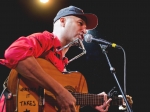
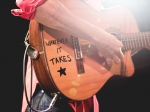

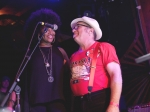
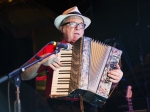
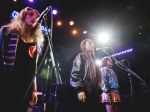
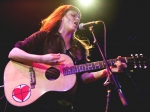
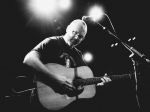

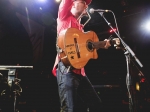
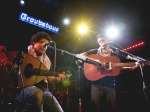
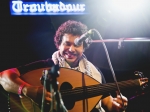
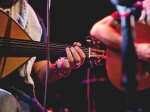
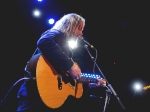
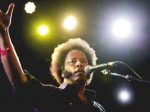
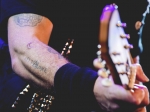


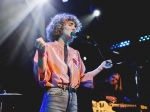
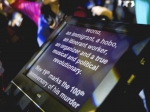

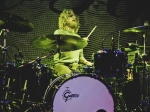
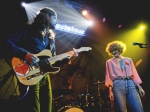
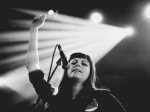
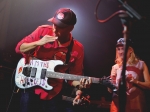
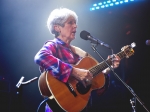
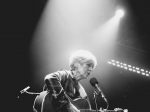
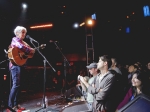
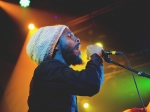
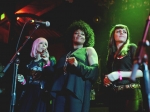
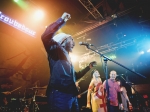
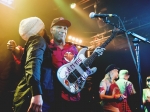

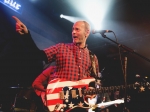
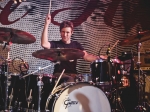
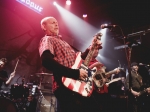

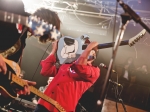
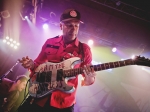
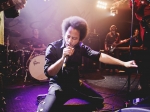
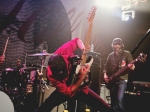
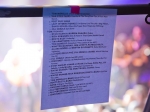




Leave a Reply